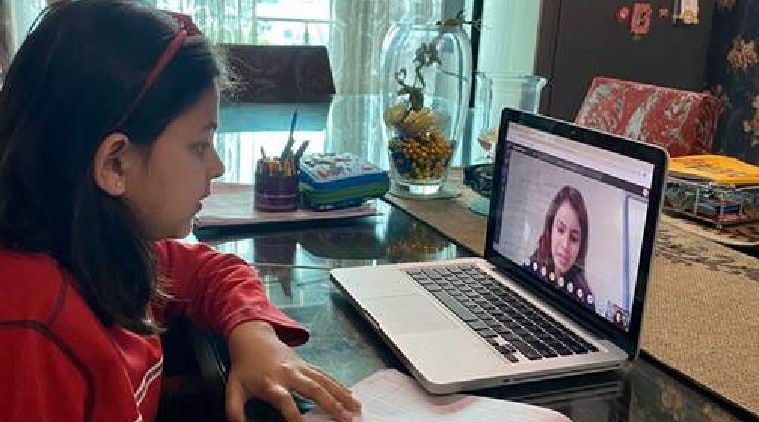Effect of increased screen time on children’s health amid lockdown
According to the pediatrician, excess screen time does not explicitly hamper learning capabilities, but can create attention deficiency and extreme mood alterations in children, which in turn disrupts learning capabilities.
 According to Dr Malhi, excess screen time does not explicitly hamper learning capabilities, but can create attention deficiency and extreme mood alterations in children, which in turn disrupts learning capabilities.
According to Dr Malhi, excess screen time does not explicitly hamper learning capabilities, but can create attention deficiency and extreme mood alterations in children, which in turn disrupts learning capabilities.
With schools shut down, and most children holed up inside their houses all day, most are increasingly dependent on the digital medium for both education and recreation. Though the digital medium can be beneficial in many ways, providing access to quality education even during these uncertain times, increased exposure to the screen can be harmful to a child’s health in myriad ways.
Does excess screen time affect developmental growth and learning capabilities in children?
Dr Parbhjot Malhi from PGIMER’s department of Pediatrics, who has written a review article on “Screen time in under-five children” published by the Indian Academy of Pediatrics, says that not all screen time is necessarily bad for children. “During the lockdown of course, we shouldn’t forget how necessary screen time is for children’s education and how useful technology has been to restore some sense of normalcy, but the problem arises when there is excess of recreational screen time,” says Dr Malhi.
According to the pediatrician, excess screen time does not explicitly hamper learning capabilities, but can create attention deficiency and extreme mood alterations in children, which in turn disrupts learning capabilities. “It is an established fact that active learning is the best way to retain information, so if they stare at a screen all day then their attention spans will decrease. They will have issues concentrating in class which will affect learning,” says Dr Malhi.
Apart from attention deficiency, excessive screen time also disrupts sleeping patterns. “The blue light emanated by screens can impair melatonin production which in turn impairs sleep,” says Dr Priti Arun, a psychiatrist from GMCH-32, who is also the joint principal for the school for intellectually disabled children in Sector 31.
However, in some cases, the digital medium can also prove to be a boon, providing means on interactive stimulation. “It is not all bad for a limited time period. Even classrooms can be boring and hard to concentrate in, but sometimes some digital education platforms can prove to be more interactive and beneficial for children,” adds Dr Arun. Hence, though hours of watching cartoon will hamper the child’s learning capabilities, an interactive quiz or game could be more helpful than a class taught by a dreary teacher.
How does screen time effect one’s physical health?
Though there is still no conclusive evidence of how excessive screen time and lack of outdoor activity affects the vision, some studies suggest that intense outdoor light protects people against myopia. Furthermore, close exposure to the screen is also known to cause myopia So, the combination of a lack of outdoor activity and excess screen time could result in a greater incidence in myopia in children.
Beyond issues with eyesight, incorrect posture while watching television can cause chronic muscle aches especially in the back and the neck. “If you are spending hours inside without any physical activity, it could lead to obesity and other non-communicable chronic diseases in the future as well,” says Dr Arun. The doctor adds that it is especially important to conduct some physical activity even when confined inside.
How can parents ensure a balanced routine for their children during the lockdown?
According to the WHO, children below the age of two should not be exposed to the screen at all, while children between the age of three and five shouldn’t be exposed to more than an hour of screen time in a day. However, most children above that age are dependent on the digital medium for education and recreation. “One should be able to limit the use of screen time for their children and make a balanced schedule which exposes them to different kinds of activities,” says Dr Arun.
According to Dr Malhi, it is important that children are exposed to screens in a limited time period and in a designated space of the house. “For example, children should sit on table and do their class work even if they do it through screens. Televisions should not be placed in the bedroom so they can disassociate activities they do in the bedroom from watching TV,” says Dr Malhi.
According to the doctor, since televisions are kept in bedrooms these days, children spend their whole days on the bed, conducting all their daily activities in a sedentary state.
Dr Arun suggests that children be made a part of routine household chores, especially during the lockdown since they have more times on their hands.
As for stimulating the child’s mind and immersing them in active learning, medical experts suggest that parents spend time with their children by playing board games, building puzzles and reading to them. “Especially if reading habits are inculcated before bedtime, children will sleep quite easily,” says Dr Arun.








